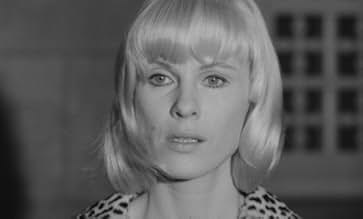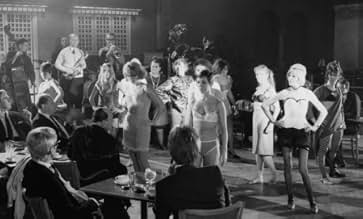Ajouter une intrigue dans votre langueThree Swedish stage actresses give differing interpretations of the classic Aristophanes play "Lysistrata."Three Swedish stage actresses give differing interpretations of the classic Aristophanes play "Lysistrata."Three Swedish stage actresses give differing interpretations of the classic Aristophanes play "Lysistrata."
Margreth Weivers
- Tourist Manager's Wife
- (as Margaret Weivers)
Signe Enwall
- Choir Member
- (as Signe Envall)
Histoire
Le saviez-vous
- ConnexionsFeatured in Stjärnbilder (1996)
Commentaire en vedette
This is an amazing underrated movie. It' funny, intelligent and deals critically with gender issues and with the difficulty in reaching out to people and producing change. Of course, if you're really sexist this film is not for you, you surely won't agree with me. There are many things I liked about this movie, but I'd like to point out two.
First, about it's form. It's not a traditional movie, it has some non realist (metaphorical or surreal) scenes, it mixes the reality of the film with the memories, desires and imagination of the characters, it mixes the Swedish life of it's time with Aristophanes play Lysistrata and keeps jumping from one to the other. So you have to think actively to interpret the meaning of these jumps. If you don't like this kind of direction and prefer a more traditional one, perhaps you won't like this movie as much as me (or you will end up thinking the film doesn't have a plot just because you couldn't follow it like some other reviewers). But be assured that this is not confusing nor formalist. It always has meaning and is always related to reality. And this is incredible in a time that most of the art that tries to reach beyond traditional forms looses meaning and relation to reality becoming formalist and sometimes even irrationalist.
Second, about the gender issues. I also liked a lot that it's not a plain movie in which the protagonists give a speech about women freedom and the women rise in a revolt. Actually one may say that this movie is more about trying to reach out and hitting a wall. About women not being taken seriously in a sexist society no matter how hard and seriously they try. Not even by most of the other women. And in this sense, the choice of Lysistrata as a mean to produce change is very good, because the women's revolt in this play was meant to be a joke and not taken seriously. In ancient Athens women were not allowed in the comedies, only in the tragedies, so this play was written by a man, to be represented by a cast of men for an audience of men and not to reach out to women. The critical power of the play, if you may say so, is in the fact that it was an anti-war play, it was meant to help to increase support for a peace treaty with Sparta, but not to really deal with gender issues in the sexist ancient Greece.
All in all this was an avant-garde movie way ahead of it's time. And I disagree with the reviews that state that this is a dated movie. Of course it bears the marks of it's time (like every movie), but perhaps it may even be better appreciated now than when it was filmed.
If you liked this movie you may want to check out Älskande par (Loving Couples), another movie of Mai Zetterling that touch gender issues, but not in such a direct way and with a less innovative and experimental directorial style.
First, about it's form. It's not a traditional movie, it has some non realist (metaphorical or surreal) scenes, it mixes the reality of the film with the memories, desires and imagination of the characters, it mixes the Swedish life of it's time with Aristophanes play Lysistrata and keeps jumping from one to the other. So you have to think actively to interpret the meaning of these jumps. If you don't like this kind of direction and prefer a more traditional one, perhaps you won't like this movie as much as me (or you will end up thinking the film doesn't have a plot just because you couldn't follow it like some other reviewers). But be assured that this is not confusing nor formalist. It always has meaning and is always related to reality. And this is incredible in a time that most of the art that tries to reach beyond traditional forms looses meaning and relation to reality becoming formalist and sometimes even irrationalist.
Second, about the gender issues. I also liked a lot that it's not a plain movie in which the protagonists give a speech about women freedom and the women rise in a revolt. Actually one may say that this movie is more about trying to reach out and hitting a wall. About women not being taken seriously in a sexist society no matter how hard and seriously they try. Not even by most of the other women. And in this sense, the choice of Lysistrata as a mean to produce change is very good, because the women's revolt in this play was meant to be a joke and not taken seriously. In ancient Athens women were not allowed in the comedies, only in the tragedies, so this play was written by a man, to be represented by a cast of men for an audience of men and not to reach out to women. The critical power of the play, if you may say so, is in the fact that it was an anti-war play, it was meant to help to increase support for a peace treaty with Sparta, but not to really deal with gender issues in the sexist ancient Greece.
All in all this was an avant-garde movie way ahead of it's time. And I disagree with the reviews that state that this is a dated movie. Of course it bears the marks of it's time (like every movie), but perhaps it may even be better appreciated now than when it was filmed.
If you liked this movie you may want to check out Älskande par (Loving Couples), another movie of Mai Zetterling that touch gender issues, but not in such a direct way and with a less innovative and experimental directorial style.
- joaquimmsl
- 17 juill. 2024
- Lien permanent
Meilleurs choix
Connectez-vous pour évaluer et surveiller les recommandations personnalisées
- How long is The Girls?Propulsé par Alexa
Détails
- Durée1 heure 40 minutes
- Couleur
- Mixage
- Rapport de forme
- 1.66 : 1
Contribuer à cette page
Suggérer une modification ou ajouter du contenu manquant

Lacune principale
By what name was Flickorna (1968) officially released in Canada in English?
Répondre
































